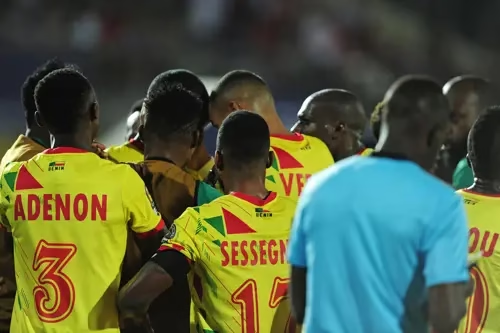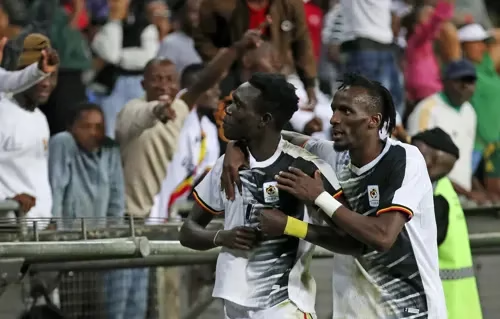
Gabon, Benin, Uganda, Botswana, and Zimbabwe are returning to the TotalEnergies CAF Africa Cup of Nations finals after missing out on the last edition played last year in Cote d’Ivoire.
CAFOnline takes a closer look at the chances of these teams as they prepare to make a grand return to Africa’s most prestigious competition.
Gabon: Huge Challenges Against Cameroon and Cote d’Ivoire
Gabon qualified for the 2025 Africa Cup of Nations TotalEnergies Morocco after finishing second in Group B with 10 points, behind Morocco (18 points). The Panthers return to the continental showpiece after their 2021 appearance in Cameroon, where the team, then led by French coach Patrice Neveu, was eliminated in the Round of 16 by Burkina Faso.
Placed in Group F, the team led by Thierry Mouyouma has not been fortunate with the draw, as they find themselves in a group with Cameroon (5-time champions), Cote d’Ivoire (3-time champions and defending champions), and Mozambique. The Panthers, who will participate in their ninth TotalEnergies CAF AFCON, have more than a few tricks up their sleeve and will be able to count on not only their solid defense in development, but also key players such as Pierre Emerick Aubameyang, Denis Bouanga, Jim Allevinah, and Delor Kanga to help them advance from this tough group.

Benin: Drawing Inspiration from the 2019 Feat
Benin returns to the TotalEnergies CAF Africa Cup of Nations after missing the previous two editions in Cote d’Ivoire and Cameroon. The West African country’s last participation was in 2019 in Egypt, where they achieved the remarkable feat of reaching the quarterfinals. This was the team’s first-ever appearance in the quarterfinals, and they will now make their fifth appearance in Morocco.
Benin narrowly qualified after finishing second in Group D of the qualifiers with 8 points, tied with Rwanda (third place) but with a better goal difference, and behind Nigeria (11 points).
The task ahead looks daunting for Benin, who are placed in Group D alongside Senegal (winners of the 2021 edition), the Democratic Republic of the Congo (semi-finalists in the last edition), and Botswana.
However, the team can rely on the experience of their coach, Guernot Rohr, who led Nigeria’s Super Eagles to a bronze medal in the 2019 Egypt edition. Captain Steve Mounié and his teammates will also look to draw inspiration from their impressive 2019 run, where they defied expectations.
Zimbabwe: Facing Major Opponents
Zimbabwe’s last appearance was in the 2021 edition in Cameroon. The team, which finished fourth in Group B with 3 points, behind Malawi (4 points), Guinea (4 points), and Senegal (5 points), was eliminated in the group stage.
Zimbabwe qualified for the finals in Morocco after finishing second in Group J with 9 points, behind Cameroon (14 points). The Warriors managed to outclass Kenya (6 points) and especially Namibia, which had reached the Round of 16 in the last edition.
In Group B, coach Michael Nees and his players face a tough challenge against Egypt (the most successful team in the competition with 7 trophies), South Africa (third-place finishers in the last edition), and Angola (quarterfinalists last year).

Uganda: Drawing Inspiration from the Qualifiers
Uganda’s last participation was in 2019 in Egypt. That year, the Ugandan Cranes finished their campaign in the Round of 16 after placing second in Group A with 4 points, behind the host nation, Egypt (9 points), and ahead of the DR Congo (third place with 3 points). After losing 1-0 to Senegal in the Round of 16, the country failed to qualify for the next two editions.
Uganda had an excellent performance during the qualifiers, finishing second in Group K with 13 points, behind South Africa (14 points). The Cranes recorded four wins, one draw, and one loss, enough to inspire confidence going to Morocco.
In Group C, Uganda faces two African football giants: Nigeria (three-time AFCON winners) and Tunisia (winners in 2004), as well as Tanzania, their East African neighbour and co-host for the 2027 edition of the AFCON. The task will not be easy for Paul Put and his players, but they can draw inspiration from the team’s remarkable run to the final in 1978. Uganda also reached the semifinals in the 1962 edition.

Botswana: The Underdog with Great Potential
In Morocco, Botswana will only be making its their second appearance. The country’s only previous participation was in 2012, a co-hosted edition by Gabon and Equatorial Guinea, where they were eliminated in the group stage, finishing last in Group D with 0 points behind Guinea (4 points), Mali (6 points), and Ghana (7 points).
Thirteen years later, the Zebras return with much greater ambitions after an impressive qualifying campaign where they surpassed Cape Verde and Mauritania—both teams that participated in the last edition—to secure second place in Group C with 8 points, behind Egypt (14 points).
Their crucial double victory over Cape Verde, a quarter-finalist in the last AFCON, during the qualifiers proves that Thabang Sesinyi and his teammates have the potential to make their opponents in Group D, including Senegal, the Democratic Republic of the Congo, and Benin, take notice.



